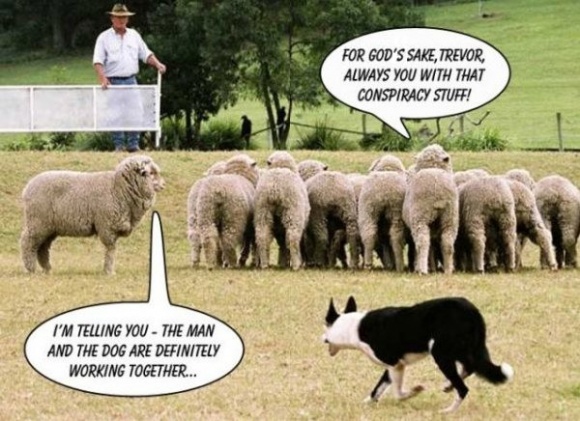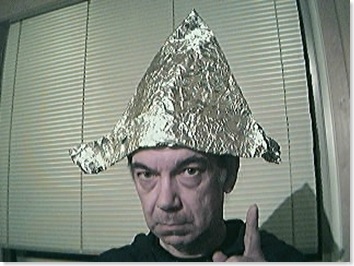Conspiracy theory
Contents
Literal Denotation
A 'conspiracy' is an agreement between two or more people to commit a crime at some time in the future, and a 'theorist' is someone who creates theories, so the literal denotation of a 'conspiracy theorist' is someone who theorises about conspiracies.
Influential 1967 Use by CIA
NYU Media Professor Mark Crispin Miller records that the phrase 'conspiracy theory' became popular in journalistic discourse as a label for describing commentators who publicly doubted the findings of the Warren Commission.[1] An explanation for this is provided by the declassified CIA memo# 1035-960 entitled "Countering Criticism of the Warren Report" examines the widespread disbelief of the Warren Commission report with concern:
"This trend of opinion is a matter of concern to the U.S. government, including our organization [the CIA]... Conspiracy theories have frequently thrown suspicion on our organization, for example by falsely alleging that Lee Harvey Oswald worked for us. The aim of this dispatch is to provide material for countering and discrediting the claims of the conspiracy theorists..." The memo recommends that its recipients "employ propaganda assets [in the media] to answer and refute the attacks of the critics".
Change of meaning
Professor Miller suggests that an attempt was orchestrated by the CIA and their friends in the media to soil the phrase 'conspiracy theorist' with connotations of craziness, noting that since 1980 it has taken on an almost exclusively perjorative connotation, as if any and all conspiracies contrary to the official narrative are necessarily unlikely in the extreme. As Miller notes, the reverse was assumed to be true in the public discourse only a century or so back; distrust of authority used to be very common place, and formed the backdrop of a lot of political negotiations and some fo the laws passed in USA. Conspiracy was formerly understood to be a potent force.[1]
Nowadays however, the label 'conspiracy theorist' has become an ad hominem attack used on those with opinions which threaten the powers that be, as if anyone harboring such thoughts can be safely dismissed as a victim of irrational paranoia, possibly even mentally unbalanced or dangerous. The commercially-controlled media clearly have a vested interest in casting suspicion on anyone whose primary source of information is elsewhere as inherently suspect. Hence a set of often repeated stereotypes which lump the patently absurd together with well-founded doubts about the Official Narrative and label them all as 'conspiracy theory'.
Wikipedia on Conspiracy Theories
Wikipedia's list of conspiracy theories is an interesting read as a reflection of how commercially-controlled media would like people to behave. The 'Conspiracy Theorist as defective personality' meme is present, with Wikipedia reporting that "The motivations for nations starting, entering, or ending wars are often brought into question by conspiracy theorists."
Marginalization
In the section on assassinations, Wikipedia notes that "the question of Who benefits? (Cui bono?) is also often asked, with conspiracy theorists asserting that insiders often have far more powerful motives than those to whom the assassination is attributed by mainstream society". In the case of the JFK Assassination, since the majority of the US population doubt the Kennedy was killed by a "lone nut", this use of the adjective "mainstream" cannot be interpreted numerically. How then is it best understood? Since the US House Committee on Assassinations, the official US government position is that Kennedy was probably killed due to a conspiracy, this "mainstream" does not necessarily even mean the "government narrative". The "mainstream" in question is the self-styled, commercially-controlled media, which loves to represent itself as "mainstream", and any deviation from it as suspect.
Modern Connotations
Wikipedia states that "a conspiracy theory explains an event as being the result of an alleged plot by a covert group or organization or, more broadly, the idea that important political, social or economic events are the products of secret plots that are largely unknown to the general public."[2]
The following is extracted from Peter Lavenda's Prologue to "The Most Dangerous Book in the World: 9/11 as Mass Ritual" a 2012 book by SK Bain. [3] To the extent that the terms 'Conspiracy Theorist' and 'conspiracy theory' have aquired a validity distinct from both their original dictionary definitions and the pejorative usage outlined above, this extract nails it:
“They have one foot in the world of mainstream history and culture, what Robert Anton Wilson used to call “consensus reality.” That’s the world where most of us live. We are all products of that world, and of the ideas and worldview it represents. We are trained in this world virtually from birth: school, church, government, media all conspire to present an image - a picture - of reality that will result in the development of perfect citizens in an easily-managed society. There is a social contract:
we contribute to this society with the expectation that we will receive goods and services in return. We obey the laws that are created by other people, believing that our best interests are being addressed thereby. We fight in wars declared by our governments in order to preserve our society - this carefully-structured, albeit artificial, society.
And all is right with the world.
But conspiracy theorists have their other foot ... well, somewhere else. Not everyone is asleep to the darker mechanisms of reality. In fact, everyone becomes aware of them at some point in their lives. Everyone questions. The very nature of reality itself is at times so hostile to human life that human institutions must be challenged for their inadequate protection of their constituents. Conspiracy theorists seize on this inadequacy as evidence of the tenuousness of consensus reality. There are other forces at work, forces that are unacknowledged by the state, the church, the media because to admit their existence is to admit failure. Thus, when things go wrong, terrorists are blamed, or communists, or witches. This serves to rally the citizens around the government once again, instead of stopping to insist that explanations be given, that evidence is properly analyzed, that the guilty are apprehended and punished. And we once more go to war, against … someone, somewhere.
Paranoia becomes institutionalized. It is appropriated by the government as its own prerogative. The state determines the nature and quality of the paranoia: it creates intelligence agencies whose sole purpose is to give a form to paranoia, to enshrine paranoia as one of the necessary qualities of an observant and caring state. To prove that paranoia is an acceptable characteristic of the paternalistic regime.
The citizens are not allowed to become paranoid unless it is at government direction and sanction. Individual cases of paranoia are frowned upon. The state tells us that if we are not paranoid the way it is paranoid—and about the same things—it’s because we don’t have all the facts: about terrorism, fundamentalism, communism, foreign countries, weapons of mass destruction, sleeper cells. The state has all the facts: classified documents, wire-tap transcripts, intelligence feeds, high-altitude reconnaissance images, none of which the citizen is permitted to see.
It does not realize that the logical conclusion of all this paranoia is suspicion of the state apparatus itself.
What the conspiracy theorist often fails to realize, however, is that those working for the state are often just as clueless as the average citizen when it comes to the origin and function of the forces at work to subvert it. The strength of a conspiracy, after all, rests in the limited number of persons who are aware of its existence and parameters. No one has the entire picture. Each member of the state apparatus only has possession of a single piece of an enormous jigsaw puzzle. Putting together all these disparate pieces—particularly when one does not have the original picture to work from—is a soul-destroying enterprise that consumes decades of work and years of one’s life. This is especially true when the state has in its arsenal of lies the techniques of disinformation and misdirection, of false testimony and planted documents.
Anyone who works with this material eventually comes to that realization. But the motivation to keep digging is still alive; the urge to uncover one more piece of the puzzle, one more document, is perhaps a central characteristic not only of the conspiracy theorist but of human nature itself. The more intelligent of the theorists soon come to realize that Hansel and Gretel have left breadcrumbs everywhere, in no discernible pattern. Thus, the inclination among some of the best to stop looking for the children and start looking for the Witch.
The deeper one delves into the conspiracy literature, the more one is struck by the tendency of some theorists to look beyond the documents and the tangible evidence of government malfeasance or political conspiracy to more transcendental sources of power. One begins with the government agents, the spies, the politicians, the military, and soon gravitates towards the secret societies: the Freemasons and the Illuminati (among so many others). This involves studying their texts, their social structures, their stated goals, their secret conclaves, their antinomian beliefs and practices.”
References
- ↑ a b 5 minutes into the first hour of http://www.unwelcomeguests.net/561
- ↑ http://en.wikipedia.org/wiki/Conspiracy_theory
- ↑ The Most Dangerous Book in the World: 9/11 as Mass Ritual by SK Bain. Trine Day Books ISBN 9781937584177

